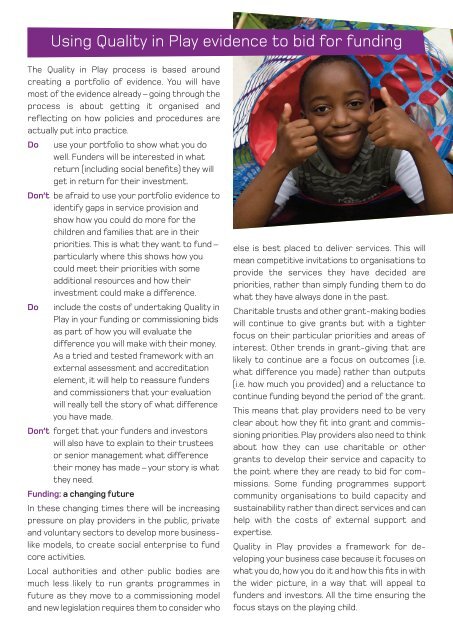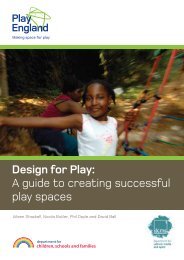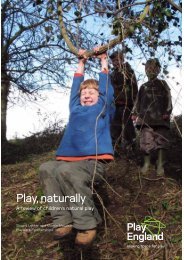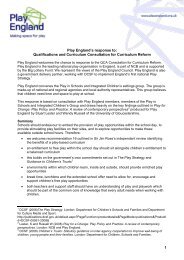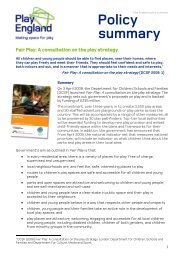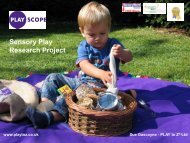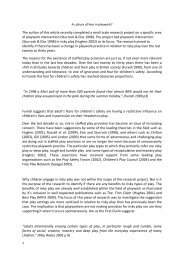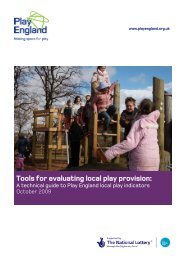Using quality assurance for funding success - Play England
Using quality assurance for funding success - Play England
Using quality assurance for funding success - Play England
You also want an ePaper? Increase the reach of your titles
YUMPU automatically turns print PDFs into web optimized ePapers that Google loves.
<strong>Using</strong> Quality in <strong>Play</strong> evidence to bid <strong>for</strong> <strong>funding</strong><br />
The Quality in <strong>Play</strong> process is based around<br />
creating a portfolio of evidence. You will have<br />
most of the evidence already – going through the<br />
process is about getting it organised and<br />
reflecting on how policies and procedures are<br />
actually put into practice.<br />
Do use your portfolio to show what you do<br />
well. Funders will be interested in what<br />
return (including social benefits) they will<br />
get in return <strong>for</strong> their investment.<br />
Don’t be afraid to use your portfolio evidence to<br />
identify gaps in service provision and<br />
show how you could do more <strong>for</strong> the<br />
children and families that are in their<br />
priorities. This is what they want to fund –<br />
particularly where this shows how you<br />
could meet their priorities with some<br />
additional resources and how their<br />
investment could make a difference.<br />
Do include the costs of undertaking Quality in<br />
<strong>Play</strong> in your <strong>funding</strong> or commissioning bids<br />
as part of how you will evaluate the<br />
difference you will make with their money.<br />
As a tried and tested framework with an<br />
external assessment and accreditation<br />
element, it will help to reassure funders<br />
and commissioners that your evaluation<br />
will really tell the story of what difference<br />
you have made.<br />
Don’t <strong>for</strong>get that your funders and investors<br />
will also have to explain to their trustees<br />
or senior management what difference<br />
their money has made – your story is what<br />
they need.<br />
Funding: a changing future<br />
In these changing times there will be increasing<br />
pressure on play providers in the public, private<br />
and voluntary sectors to develop more businesslike<br />
models, to create social enterprise to fund<br />
core activities.<br />
Local authorities and other public bodies are<br />
much less likely to run grants programmes in<br />
future as they move to a commissioning model<br />
and new legislation requires them to consider who<br />
else is best placed to deliver services. This will<br />
mean competitive invitations to organisations to<br />
provide the services they have decided are<br />
priorities, rather than simply <strong>funding</strong> them to do<br />
what they have always done in the past.<br />
Charitable trusts and other grant-making bodies<br />
will continue to give grants but with a tighter<br />
focus on their particular priorities and areas of<br />
interest. Other trends in grant-giving that are<br />
likely to continue are a focus on outcomes (i.e.<br />
what difference you made) rather than outputs<br />
(i.e. how much you provided) and a reluctance to<br />
continue <strong>funding</strong> beyond the period of the grant.<br />
This means that play providers need to be very<br />
clear about how they fit into grant and commissioning<br />
priorities. <strong>Play</strong> providers also need to think<br />
about how they can use charitable or other<br />
grants to develop their service and capacity to<br />
the point where they are ready to bid <strong>for</strong> commissions.<br />
Some <strong>funding</strong> programmes support<br />
community organisations to build capacity and<br />
sustainability rather than direct services and can<br />
help with the costs of external support and<br />
expertise.<br />
Quality in <strong>Play</strong> provides a framework <strong>for</strong> developing<br />
your business case because it focuses on<br />
what you do, how you do it and how this fits in with<br />
the wider picture, in a way that will appeal to<br />
funders and investors. All the time ensuring the<br />
focus stays on the playing child.


